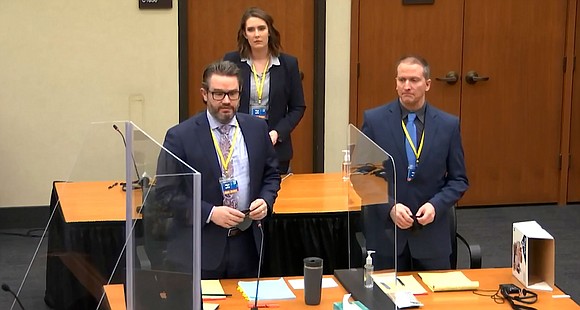Derek Chauvin trial continues with MMA fighter who watched George Floyd's death
CNN/Stylemagazine.com Newswire | 3/30/2021, 9:58 a.m.

By Eric Levenson and Aaron Cooper, CNN
(CNN) -- The second day of Derek Chauvin's trial in George Floyd's death began Tuesday with further questioning of a professional mixed martial arts fighter who stumbled onto the scene of the 46-year-old Black man's final moments.
Donald Wynn Williams II began testifying Monday as the third witness in the trial and said that he was one of the most vocal bystanders during Floyd's arrest on May 25, 2020. Relying on his own MMA experience, he said that Chauvin performed a "blood choke" on Floyd and adjusted his positioning several times to maintain pressure on Floyd's neck.
Earlier in the day, Williams had gone fishing with his son, and he decided to go to the Cup Foods store in Minneapolis to "get some air" after watching several caught fish suffocate and die. When he came upon Floyd's arrest nearby, he watched Floyd gasp for air and saw his eyes roll to the back of his head -- "like a fish in a bag," he explained.
His testimony was abruptly cut off Monday because of a technological issue.
The opening statements in Chauvin's trial came 10 months after Floyd's death launched a summer of protest, unrest and a societal reckoning with America's past and present of anti-Black racism and aggressive policing.
Chauvin, 45, has pleaded not guilty to second-degree unintentional murder, third-degree murder and second-degree manslaughter charges.
In opening statements, prosecuting attorney Jerry Blackwell said Chauvin used excessive and unreasonable force when he knelt on Floyd for 9 minutes and 29 seconds -- a number different than the infamous 8:46 timing that has become a symbol of police brutality. Chauvin's defense accepted the new timing as accurate.
Blackwell played the harrowing video and audio of Floyd's death recorded by a bystander to bolster his argument and offered jurors a clear and simple case against Chauvin.
"You can believe your eyes that it's a homicide," he said. "You can believe your eyes."
In response, defense attorney Eric Nelson argued that the case was more complicated than just that video. He said Chauvin was following his police use of force training and argued Floyd's cause of death was a combination of drug use and preexisting health issues.
"The use of force is not attractive, but it is a necessary component of policing," he said.
The first day of witness testimony also featured a Minneapolis 911 dispatcher. She was able to watch live video of Floyd's arrest at the time and called a police sergeant afterward to voice her concerns about the arrest.
"My instincts were telling me that something's wrong. Something was not right. I don't know what, but something wasn't right," Jena Scurry said she thought as she watched the video. "It was an extended period of time."
An employee at a Speedway gas station across the street also testified as prosecutors showed videos she filmed of Floyd's arrest.
What it's like in the courtroom
Because of the Covid-19 pandemic, attendance is strictly limited inside the courtroom. The trial is being broadcast live in its entirety, giving the public a rare peek into the most important case of the Black Lives Matter era.
Only one member of Floyd's family is allowed to attend the trial each day, and on Monday Floyd's brother Philonise Floyd took that spot in court.
Philonise Floyd told CNN on Tuesday that being in the courtroom was an "emotional roller coaster."
"To everybody else, it was a case and a cause. To me, it was my brother, somebody that I grew up with, eating with, sleeping in the same bed with, going fishing with, just watching him dance with my mother," he said. "Those are the things that I think about when I think about my brother. He was a protector, he was someone who we can go to when we were in trouble and in need of anything."
His place in the courtroom was just feet from Chauvin, who has been taking notes on a large notepad during jury selection and the trial.
"I've seen him. I watched him. I watched the reaction when the witnesses were responding to questions they were asked," Philonise Floyd said. "He's in there, he's fighting for his life, just like I'm fighting for my brother's life. We've seen the video. We have facts. They're in there trying to assassinate his character. When you don't have facts, that's what you have to do."
Witness testimony in the trial is expected to last about four weeks, followed by jury deliberations.
The second-degree murder charge says Chauvin intentionally assaulted Floyd with his knee, which unintentionally caused Floyd's death. The third-degree murder charge says Chauvin acted with a "depraved mind, without regard for human life." And the second-degree manslaughter charge says Chauvin's "culpable negligence" caused Floyd's death.
Chauvin could be convicted of all, some, or none of the charges. Minnesota's sentencing guidelines recommend about 12.5 years in prison for each murder charge and about four years for the manslaughter charge.



